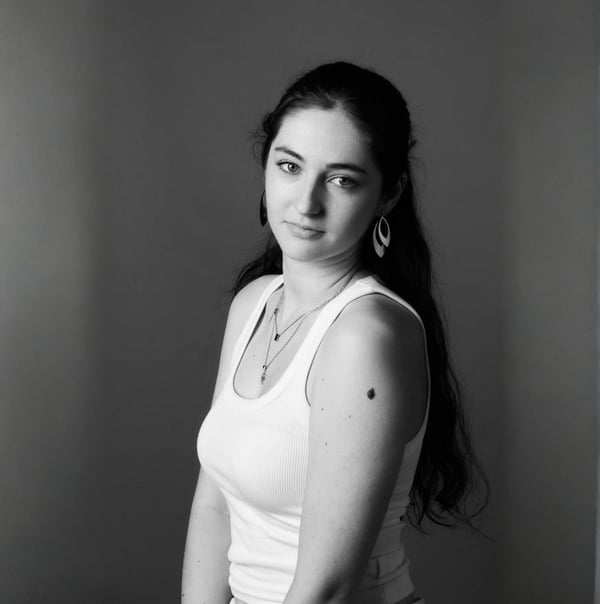How AI Can Help You Extend and Enhance Your Images
Table of Contents
In today’s world, visual presentation is everything. Whether you're designing a marketing campaign, curating a social media feed, or creating digital art, image composition plays a key role. But what happens when your image doesn’t quite fit the format you need? Perhaps it’s cropped too tightly, or maybe you want to create additional space for text, overlays, or artistic effect. Learning how to extend images with AI gives you the flexibility to reframe your visuals with minimal effort, and impressive results.
AI tools are making it easier than ever to expand images while preserving their original style, context, and visual coherence. In this in-depth guide, we’ll explore how AI can help you extend, recompose, and elevate your images, and introduce you to some of the best practices and platforms to get started.
What Does It Mean to Extend an Image?
Extending an image refers to the process of increasing its size or canvas area by adding content around the original image. Instead of simply stretching or duplicating the edges, AI tools use pattern recognition and context prediction to generate new areas that blend naturally with the existing content. This technique is also known as outpainting or content-aware expansion.
Here are a few scenarios where extending an image is useful:
Reformatting a horizontal photo for a vertical layout
Creating banner-ready versions of portraits
Expanding background space for quotes or text overlays
Restoring cropped images
Generating panoramic-style visuals
Unlike traditional editing, where manual cloning and patching can look artificial or inconsistent, AI image extension offers natural and highly realistic results.
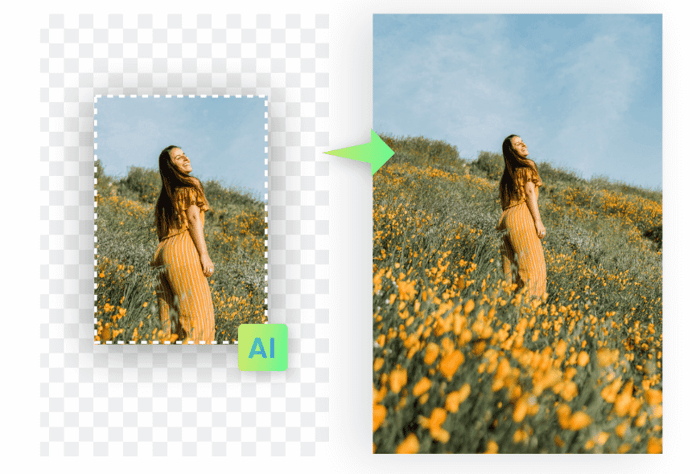
Why Use AI to Extend Images?
AI makes the image extension process faster, more intuitive, and more effective. Here’s why:
1. Time-Saving AI tools automate the once manual and tedious process of extending backgrounds or filling empty space. What used to take hours with editing software can now be done in minutes.
2. Realistic Results AI algorithms are trained on vast datasets and can understand context, color gradients, lighting, and object boundaries. This ensures smooth transitions and natural compositions.
3. Creative Flexibility Need to reframe an image to fit a different format? AI lets you do so without compromising the aesthetic value or quality. This is particularly helpful in content creation, where formats like stories, reels, banners, and thumbnails require different dimensions.
4. Accessibility Most AI-based tools require little to no editing experience. With user-friendly interfaces and automated workflows, even non-designers can extend images effectively.
Step-by-Step: How to Extend Images with AI
Step 1: Choose the Right Tool
Start by selecting an AI platform suited for image expansion. Some of the most popular and effective tools include:
DALL·E: Offers an outpainting feature that lets you upload an image and extend it using prompts.
Runway ML: A browser-based video and image editing suite with image extension tools.
Photoshop (Content-Aware Fill + Generative Expand): Combines AI with traditional editing for seamless expansion.
Modelia: Known for fashion visuals, Modelia also enables background expansion to reframe product and model images elegantly.
Krea.ai: A creative visual editing tool that includes upscaling and smart background growth.
Each of these platforms works slightly differently, but all offer the ability to extend an image beyond its original frame.
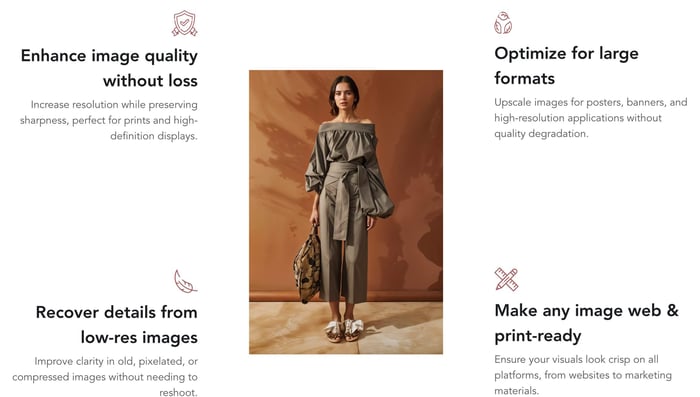
Step 2: Upload Your Image
Once you’ve selected your tool, begin by uploading the image you want to expand. Ideally, it should be high-resolution to give the AI better detail to work with.
Make sure the image is cropped in a way that leaves some room for creative extension. For example, a portrait with the subject centered will allow space to expand the left or right side.
Step 3: Select the Extension Area
Most tools allow you to choose where you want to expand the image—top, bottom, left, right, or all sides. Some offer auto-cropping and auto-fill based on smart detection of image boundaries.
Others, like Photoshop or Runway, provide masking tools or frame extenders. This lets you visualize where the new content will appear and how it integrates with the original image.
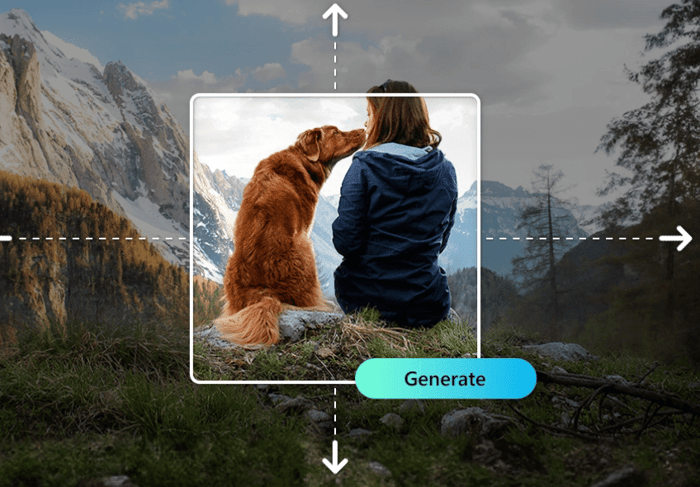
Step 4: Let AI Generate the Expansion
Once the area is defined, hit the generate or fill button. The AI engine will analyze your image and generate new content that matches its tone, texture, and lighting.
Depending on the tool, you may get multiple suggestions, or the ability to regenerate until the outcome fits your vision. Some platforms even let you provide a prompt or keyword (e.g., "extend beach into sunset sky") to guide the AI’s creativity.
Step 5: Make Refinements (Optional)
If needed, fine-tune the expanded image by adjusting color balance, contrast, or applying light retouching. Most AI image tools include built-in filters and adjustments, or allow exporting to editing software for further refinement.
Preview your final result and ensure the new portions look seamless. Once satisfied, download in your desired format (JPG, PNG, etc.).
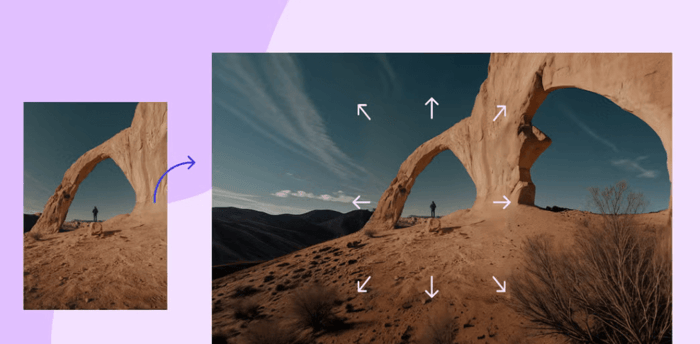
Tips for Better Image Extension with AI
To get the best results when learning how to extend images with AI, keep these expert tips in mind:
Use clean, uncluttered edges: Images with sharp borders or visual simplicity make it easier for AI to predict continuation.
Avoid overlapping text or busy elements: These can confuse the AI and result in messy expansion.
Go high-resolution: More pixels = more precision. Use large files whenever possible.
Keep extensions subtle: AI does best when asked to extend natural elements like sky, grass, water, walls, or shadows.
Experiment with prompts: For tools like DALL·E, you can guide AI creativity by entering descriptive keywords.
Use Cases: Where Image Extension Adds Value
Whether you're an artist or a digital marketer, here are some key areas where AI-based image extension makes a difference:
Social Media Marketing: Reformat photos for vertical reels, square posts, or horizontal banners without cropping key content.
E-Commerce and Fashion: Extend product photos to add branded backgrounds, lifestyle settings, or CTA zones.
Editorial and Publishing: Fill out magazine covers, blog thumbnails, or newsletter visuals while maintaining layout balance.
Web Design: Adapt hero images or sliders for responsive design without image distortion.
Creative Projects: Generate digital collages, fantasy landscapes, or panoramic images from small starters.
Spotlight: Modelia for AI Image Edition
Among the AI tools offering image extension, Modelia stands out for its specialization in high-end fashion and e-commerce content. Built specifically for stylists, designers, and fashion marketers, Modelia allows users to upload images of garments or collections and expand them into ready-to-use marketing assets.
Unlike generic tools, Modelia understands garment form, texture, and composition. Its image extension engine can generate elegant background gradients or naturalistic environmental fills (studio, minimalist, runway), providing consistency in campaign visuals. It’s particularly effective for social visuals, or online shops where uniformity and elegance matter.
The platform’s interface also allows for combining image expansion with model visualization, upscaling, and short-form video creation. This makes it a complete creative suite for fashion-forward brands seeking to create more content with fewer resources.
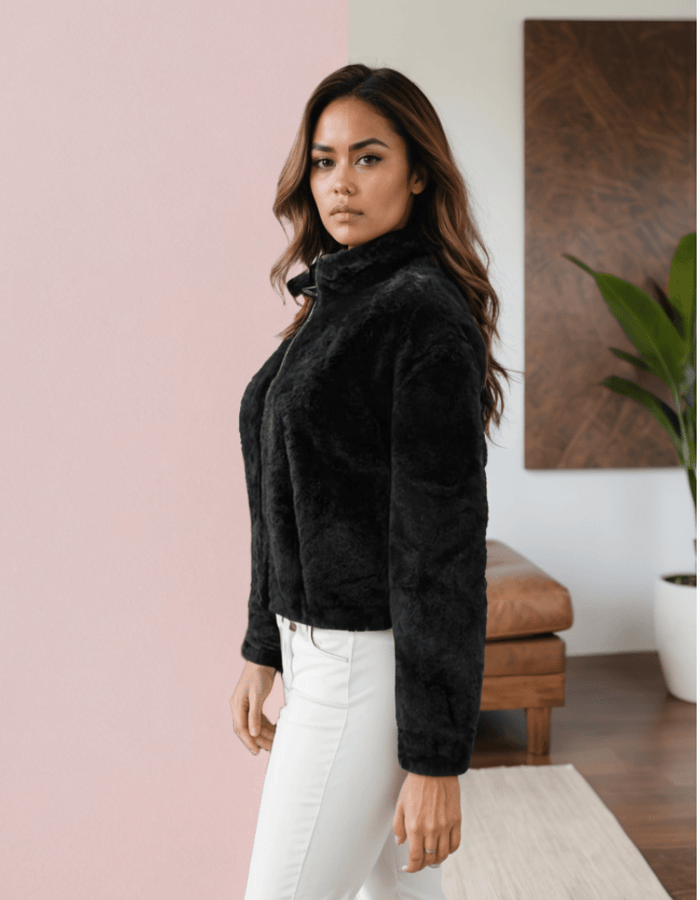
Final Thoughts
Learning how to extend images with AI is more than a technical skill, it’s a gateway to visual creativity. Whether you're repurposing content, fixing old images, or optimizing visuals for different platforms, AI tools make it easy to adapt and expand without starting from scratch. With platforms like Modelia, DALL·E, and Runway, extending your images is no longer limited to professional designers. It’s accessible to creators of all skill levels, allowing anyone to reshape and enhance their images with confidence.
So if you’ve ever looked at an image and thought “I wish there was more room on the sides,” AI just made that wish a reality. Start exploring, keep experimenting, and let your images stretch beyond the frame.
FAQs: How to extend images with AI
1. What does it mean to extend an image with AI?
Extending an image with AI means using artificial intelligence to expand the borders of a photo seamlessly. The AI analyzes existing textures, colors, and patterns to generate new visual areas that blend naturally with the original image. This technique is also known as AI outpainting or image expansion.
2. Which are the best tools to extend images with AI?
Some of the best tools to extend images with AI include Modelia, Adobe Firefly, DALL·E, Runway, and Fotor AI Expand. These platforms use advanced generative models to add background, context, or creative extensions that look realistic and professional.
3. How does AI image extension work?
AI image extension tools use machine learning models trained on large datasets of photos. When you upload an image and choose an area to expand, the AI predicts what should appear next, continuing scenery, textures, or objects, to create a cohesive and natural-looking composition.
4. What are the benefits of using AI to extend images?
Using AI to extend images saves time, eliminates the need for reshoots, and provides flexibility for creative editing. Designers, photographers, and marketers can adjust image dimensions for social media, ads, or websites while maintaining visual balance and quality.
5. Can AI tools extend images without losing quality?
Yes. Most modern AI tools can extend images while preserving sharpness and texture consistency. Advanced algorithms ensure that the added areas match the original lighting, color palette, and resolution, resulting in a seamless high-quality output.
6. Is AI image extension useful for fashion and e-commerce brands?
Definitely. Fashion and e-commerce brands use AI image extension to adjust product photos for banners, campaigns, and different aspect ratios without cropping or reshooting. It helps maintain consistency across marketing visuals while saving significant production costs.
How would you rate this article:
Related Articles
- How to Wear Bold Colors in Fashion: Styling Tips for Vibrant Outfits
- 7 Fashion Brand Marketing Strategies to Succeed in a Competitive Market
- Proven Ways to Boost ROAS in Fashion Ecommerce
- AI Clothes Swap: Revolutionizing Your Wardrobe with Virtual Outfit Transformations
- Top AI Photo Description Generator Tools for Online Sellers
- How to Stay Stylish on a Budget: Fashion Shopping Tips for the Savvy Shopper
- 3D Virtual Try-On: How Technology is Revolutionizing Online Shopping and Fashion
- 6 Best AI Image Upscaling Software to Boost Image Quality
- 5 Free AI Face Swapping Online - Best Tools
- Digital Fashion in the Metaverse: How Virtual Clothing is Shaping the Future of Online Style


